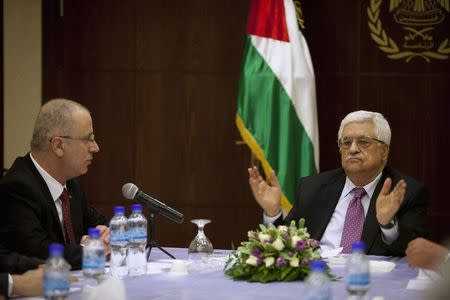Palestinian reconciliation hobbled by continued disunity

By Nidal al-Mughrabi GAZA (Reuters) - The swearing in of a Palestinian unity government on Monday will not end the divisions that have plagued the West Bank and Gaza Strip for years, providing a veneer of harmony but little change on the ground, analysts say. Although no longer in government, the Islamist group Hamas will maintain power in its Gaza stronghold, while the Western-backed President Mahmoud Abbas will remain largely unchallenged in his high-walled Ramallah headquarters. The government, packed with little-known technocrats and academics, will manage the day-to-day problems facing the Palestinians, like a glorified municipality, but decisions regarding diplomacy and security will be taken elsewhere. "Such a government won't be able to end the divisions. It is rather a political body aimed at managing the division," said Hani Al-Masri, a political analyst in the Israeli-occupied West Bank, where Abbas's Palestinian Authority has limited autonomy. Eight years after Hamas stunned the West by winning Palestinian legislative elections, and seven years after it crushed forces loyal to Abbas in Gaza, the new government is meant to close a cycle of bloodshed, hatred and disunity. Israel has promised to make life difficult for any cabinet backed by Hamas, which refuses to recognise Israel, but the rest of the world is looking on cautiously, waiting to see how much influence the Islamist group will wield over decision-making. Born more out of need than conviction, the unity pact is aimed at extracting both Abbas and Hamas from their separate crises, without undermining their personal power bases. Flying high two years ago, Hamas's fortunes slumped after the ousting last summer of their Muslim Brotherhood allies in neighbouring Egypt. The new military rulers in Cairo quickly shut off smuggling tunnels into Gaza - Hamas's financial lifeblood - piling pressure on the group at home and abroad. Increasingly unpopular in overcrowded Gaza, Hamas hopes the birth of a new government will persuade Egypt to open their sealed-off border and break an air of siege over the enclave. For Abbas, the unity pact might prop up his own sagging popularity at a time when yet another round of peace talks with the Israelis have collapsed. Elected president in 2005, his mandate expired five years ago, and officials say he did not want to be remembered as the man who left a divided Palestine. ELUSIVE ELECTIONS According to the terms of the accord, Palestinians are meant to return to the polls in six months. If they do, then real unity might be on the cards, but few believe that either side wants to rush to the ballot box during such uncertain times. "The elections will not happen," said George Giacaman, the dean of graduate studies at the West Bank's Birzeit University. "Forming a government is a symbolic step. It is a good step, but we should not exaggerate the expectations." One of the most important elements left untouched by the unity deal was the question of security, an omission that means Hamas in Gaza will remain in control of its own police and armed fighters, who together total some 45,000 men. "We exit governance, but we do not exit power," Hamas's deputy leader Ismail Haniyeh said last week. Hamas has fired hundreds of rockets into neighbouring Israel over the years, and although it has made clear it remains in charge of its arsenal, Israel has said it will henceforth hold Abbas responsible for any attacks out of Gaza. Israeli Prime Minister Benjamin Netanyahu has also threatened to put a financial stranglehold on the Palestinians, who are dependent on the Israeli banking system. Abbas has warned that he will end security cooperation with Israel if faced by financial sanctions. By the same token, he has sought to allay Israeli concerns, saying the new government recognises Israel and is committed to finding a negotiated settlement to their generations-old conflict. His words have yet to reassure Israel, which fears that Hamas militants will now be able to operate more easily within the West Bank -- something that was hitherto prevented thanks to the close security ties between Abbas and Israel. DEMILITARIZED Netanyahu is also concerned that Hamas, freed from the confines of Gaza, will press to join the Palestine Liberation Organization -- an umbrella group for political parties that is tasked with conducting peace negotiations with Israel. "For the Israelis, it is not a very good idea to let Hamas manoeuvre tactically for the purpose of trying to increase its power ultimately both in the West Bank and the PLO, while maintaining exclusive control in Gaza," said Ehud Yaari, a fellow at the Washington Institute for Near East Policy. "Abbas has accepted the principle of a demilitarized Palestinian state, but Gaza is not demilitarized. Nothing is going to change," he said. (Additional reporting in Ramallah by Ali Sawafta; Writing by Crispian Balmer; Editing by Tom Heneghan)

 Yahoo News
Yahoo News